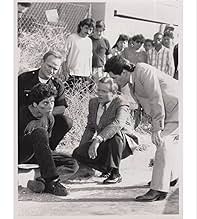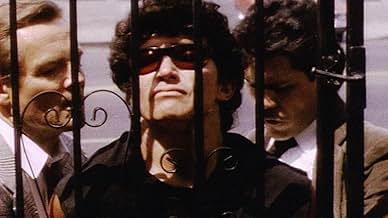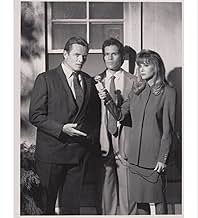Un asesino al acecho
Título original: Manhunt: Search for the Night Stalker
PUNTUACIÓN EN IMDb
6,2/10
540
TU PUNTUACIÓN
Dos detectives de la policía de Los Ángeles tratan de localizar a Richard Ramírez, conocido como el "El acosador nocturno".Dos detectives de la policía de Los Ángeles tratan de localizar a Richard Ramírez, conocido como el "El acosador nocturno".Dos detectives de la policía de Los Ángeles tratan de localizar a Richard Ramírez, conocido como el "El acosador nocturno".
Gregory Cruz
- Richard Ramirez (The Night Stalker)
- (as Gregory Norman Cruz)
Soon-Tek Oh
- Dr. Chow
- (as Soon-Teck Oh)
Reseñas destacadas
Sometimes TV movies about real events can be engaging, possibly because the producers don't have to worry about whether their 40 million dollars will be returned at the box office. The treatment of crimes on TV can be truly engaging. The films about Ted Bundy and Charles Manson were fairly well done, especially "Helter Skelter." The story of the so-called Nightstalker, Richard Ramirez, doesn't have quite the potential of the Manson story. It's simply not as intrinsically interesting. But this is more than just uninteresting. It's plain dull.
I've been trying to figure out why. The best proposal that I can come up with is that the fault lies in every aspect of the production. The photography is cloudy, the score done by the numbers. And, as another commenter pointed out, the acting is at best routine. The actors seem to be reading from cue cards half the time. Even Richard Jordan, whose work elsewhere has been quite good, is almost embarrassing to watch. His voice seems slurred and the sound man has picked up every intake of breath, as if Jordan were asthmatic. The role of Richard Ramirez is a key one, and they've used an actor who has a single expression -- a kind of bug-eyed sneer, like an evil Harpo Marx, distinctly wicked. The real Ramirez was angelic, as handsome as a movie star. Girls flocked to him, whereas no one would flock to this guy except flies. The director does nothing to help matters. Camera placement, role enactment, blocking, micromovements -- all are strictly routine. Given all the other weaknesses in the production, the director really needed to punch things up.
Maybe the script is the worst part. I wonder if the writers, while setting the dialogue down on paper, ever really imagine hearing a living human being speaking their words. Jordan "feels" things several times. He calls his partner late at night and tells him, "I have a feeling about tonight. He's going out again." When they're closing the ring around the perp, Jordan tells his partner, "This is it. I can feel it." When the perp is finally safely locked away, Jordan tells his partner solemnly, "We're going to be living with this a long time." This coming from a seasoned detective on the LAPD. Does the line ring false to anyone else? And then there is the squabble between one of the cops and his wife. It seems he's been spending too much time away from home, on the job, and she's worried and frightened, and they have an argument. "I didn't marry your work!" she yells at him tearfully. "What do you want me to do?" he shouts back. (She packs up the kids and leaves him for the duration of the case, but don't worry -- there's a lachrymose reunion at the end.) All straight out of a thousand stories about cops (or military men, or dedicated doctors). No one is really given a believable line. The characters are cartoons, none of them in any way individuated. They don't have twitches or neuroses. They don't joke. They don't make mistakes, although Diane Feinstein does.
The movie is a big long unrefreshing yawn. Too bad. It would have been interesting to know more about what happened, particularly inside Ramirez's head. But that's something we'll never know anyway. Even Ramirez doesn't know. So maybe it's just as well nobody tried to probe his brain and pin it all on the conjecture that he and his Dad were not close enough or something. Anyway, as it stands, I've read more interesting abstracts for articles in Psychiatric Quarterly, and that's saying a lot.
I've been trying to figure out why. The best proposal that I can come up with is that the fault lies in every aspect of the production. The photography is cloudy, the score done by the numbers. And, as another commenter pointed out, the acting is at best routine. The actors seem to be reading from cue cards half the time. Even Richard Jordan, whose work elsewhere has been quite good, is almost embarrassing to watch. His voice seems slurred and the sound man has picked up every intake of breath, as if Jordan were asthmatic. The role of Richard Ramirez is a key one, and they've used an actor who has a single expression -- a kind of bug-eyed sneer, like an evil Harpo Marx, distinctly wicked. The real Ramirez was angelic, as handsome as a movie star. Girls flocked to him, whereas no one would flock to this guy except flies. The director does nothing to help matters. Camera placement, role enactment, blocking, micromovements -- all are strictly routine. Given all the other weaknesses in the production, the director really needed to punch things up.
Maybe the script is the worst part. I wonder if the writers, while setting the dialogue down on paper, ever really imagine hearing a living human being speaking their words. Jordan "feels" things several times. He calls his partner late at night and tells him, "I have a feeling about tonight. He's going out again." When they're closing the ring around the perp, Jordan tells his partner, "This is it. I can feel it." When the perp is finally safely locked away, Jordan tells his partner solemnly, "We're going to be living with this a long time." This coming from a seasoned detective on the LAPD. Does the line ring false to anyone else? And then there is the squabble between one of the cops and his wife. It seems he's been spending too much time away from home, on the job, and she's worried and frightened, and they have an argument. "I didn't marry your work!" she yells at him tearfully. "What do you want me to do?" he shouts back. (She packs up the kids and leaves him for the duration of the case, but don't worry -- there's a lachrymose reunion at the end.) All straight out of a thousand stories about cops (or military men, or dedicated doctors). No one is really given a believable line. The characters are cartoons, none of them in any way individuated. They don't have twitches or neuroses. They don't joke. They don't make mistakes, although Diane Feinstein does.
The movie is a big long unrefreshing yawn. Too bad. It would have been interesting to know more about what happened, particularly inside Ramirez's head. But that's something we'll never know anyway. Even Ramirez doesn't know. So maybe it's just as well nobody tried to probe his brain and pin it all on the conjecture that he and his Dad were not close enough or something. Anyway, as it stands, I've read more interesting abstracts for articles in Psychiatric Quarterly, and that's saying a lot.
I know the story is simplified, but of course it had to be to make a 95 minute movie.
I'm no expert on the case, but it looks like they got the gist right, and more than that. It was just boiled down.
The East LA takedown of Richard Ramirez was very very close to accurate. To my understanding, Ramirez actually ran across the freeway. Here, he takes a bus. That's an understandable compromise for a TV budget.
The lead actors (A Martinez and the late Richard Jordan) never quite made A list, but that has a lot to do with luck. Their performances are great.
The actual focus on the lives of the detectives, well that's soap, but not terribly soapy.
Overall, a necessarily simplified, but basically an accurate depiction of this history.
From a purely movie/directing standpoint, the takedown of the Stalker was gripping and well done.
I'm no expert on the case, but it looks like they got the gist right, and more than that. It was just boiled down.
The East LA takedown of Richard Ramirez was very very close to accurate. To my understanding, Ramirez actually ran across the freeway. Here, he takes a bus. That's an understandable compromise for a TV budget.
The lead actors (A Martinez and the late Richard Jordan) never quite made A list, but that has a lot to do with luck. Their performances are great.
The actual focus on the lives of the detectives, well that's soap, but not terribly soapy.
Overall, a necessarily simplified, but basically an accurate depiction of this history.
From a purely movie/directing standpoint, the takedown of the Stalker was gripping and well done.
I can say it always amazes me when true stories are changed when made into a movie. Television is notorious for this and this movie follows suit. Certain aspects are glossed over or not even explained. The acting at best is average with more bad then good. Overall if you know nothing about the night stalker and want to know there are way better to see then this. Its a film that should be skipped.
I live in El Paso, Richard Ramirez's (The Night Stalker) hometown, so this story has a special interest for me. But I was disappointed in the very poor acting throughout this movie. The only acting that was at all believable was that of one witness, an older lady who discovered one of the bodies. It's a shame they couldn't have found some better actors, as this could have been a decent movie if they had.
On the bright side, I commend them for making this film without the blood and gore that we usually see. I guess that's because it was made for TV, but it was a refreshing change.
I wish they would have focused more on Ramirez and his crimes (absolutely nothing was said about his background or motives). This movie was really only about the two detectives who investigated the crimes and not about the crimes or suspect at all.
On the bright side, I commend them for making this film without the blood and gore that we usually see. I guess that's because it was made for TV, but it was a refreshing change.
I wish they would have focused more on Ramirez and his crimes (absolutely nothing was said about his background or motives). This movie was really only about the two detectives who investigated the crimes and not about the crimes or suspect at all.
MANHUNT: SEARCH FOR THE NIGHT STALKER
Aspect ratio: 1.33:1
Sound format: Mono
The search for serial killer Richard Ramirez, who committed a string of horrific rapes and murders in Los Angeles between June 1984 and August the following year.
It looks a little dated now, but Bruce Seth Green's detailed examination of the facts surrounding the Night Stalker murders - filtered here through the viewpoint of the two detectives (Richard Jordan and A Martinez) who supervised the case - still packs a solid emotional punch. Green's no-nonsense approach to the material results in a couple of voyeuristic crime reconstructions which may strike some as unnecessary (Ramirez had only just been convicted when the movie first aired), but these grotesque details go a long way toward establishing the randomness and savagery of this man's gruesome rampage. Joseph Gunn's wide-ranging script covers all relevant bases, including the desperate attempts by city officials to prevent sensational media coverage driving the killer underground, and the personal toll exacted on law enforcement officers involved in pursuit of the maniac. The climactic sequence - depicting the bizarre events surrounding Ramirez' eventual capture - is ripe with irony, and well-staged by actors and filmmakers alike.
Aspect ratio: 1.33:1
Sound format: Mono
The search for serial killer Richard Ramirez, who committed a string of horrific rapes and murders in Los Angeles between June 1984 and August the following year.
It looks a little dated now, but Bruce Seth Green's detailed examination of the facts surrounding the Night Stalker murders - filtered here through the viewpoint of the two detectives (Richard Jordan and A Martinez) who supervised the case - still packs a solid emotional punch. Green's no-nonsense approach to the material results in a couple of voyeuristic crime reconstructions which may strike some as unnecessary (Ramirez had only just been convicted when the movie first aired), but these grotesque details go a long way toward establishing the randomness and savagery of this man's gruesome rampage. Joseph Gunn's wide-ranging script covers all relevant bases, including the desperate attempts by city officials to prevent sensational media coverage driving the killer underground, and the personal toll exacted on law enforcement officers involved in pursuit of the maniac. The climactic sequence - depicting the bizarre events surrounding Ramirez' eventual capture - is ripe with irony, and well-staged by actors and filmmakers alike.
¿Sabías que...?
- CuriosidadesBy accident or design, Manhunt: Search for the Night Stalker was telecast November 12, 1989,the very day that Richard Ramirez was sentenced to the gas chamber.
- PifiasOn two separate occasions, the US Bank Tower is visible: once in the opening credits (hard to see due to darkness, but that's definitely it) and again near the end when Ramirez is trying to evade police. This building didn't begin construction until 1987, two years after the film's setting.
- ConexionesFeatured in Confessions of a Hollywood Stuntman (2014)
Selecciones populares
Inicia sesión para calificar y añadir a tu lista para recibir recomendaciones personalizadas
Detalles
- Fecha de lanzamiento
- País de origen
- Idioma
- Títulos en diferentes países
- Manhunt: Search for the Night Stalker
- Localizaciones del rodaje
- Los Ángeles, California, Estados Unidos(Location)
- Empresas productoras
- Ver más compañías en los créditos en IMDbPro
Contribuir a esta página
Sugerir un cambio o añadir el contenido que falta

Principal laguna de datos
By what name was Un asesino al acecho (1989) officially released in India in English?
Responde




























